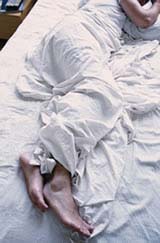Oversleepers may die early

Seven hours sleep a night could be the optimum <br>© PhotoDisc <br>
’Sleeping your life away’ could be more than a saying.
Excessive sleeping may increase your risk of an early death by up to 15%. So hints a new analysis of data collected on one million people by the American Cancer Society. The figures cast doubt on the reputed benefits of eight hours’ sleep a night.
People with the longest lives get only seven hours of sleep each night, find psychiatrists at the University of California, San Diego1. Why seven is the magic number is not clear. And sleeping more appears to be riskier than sleeping less. On the short side, increased mortality kicks in only when you get below four hours.
This unprecedented peek into the habits of so many people claims to be the first to determine the relationship between sleep and mortality, while controlling for other factors such as weight, smoking and exercise.
Currently, the average American gets about six-and-a-half hours sleep, much lower than the standard recommendation of eight hours. The new analysis suggests that patients may seek treatments unnecessarily in attempts to attain the eight-hour target.
“If people don’t sleep eight hours, they have nothing to worry about,” says Daniel Kripke, a member of the team.
Insomniacs, the data suggest, have no greater risk of premature death. Sleeping pills, in contrast, might just shave some days off your life. Kripke’s group plans to conduct experiments to determine whether setting the alarm clock can lengthen survival.
But critics of the study hope it will not be over-interpreted. They point out that the enormous data set – part of a cancer prevention study in the 1980s – was not specifically designed to analyse sleep. Insomnia was not defined, sleeping pills were not identified, and those surveyed reported their own sleep behaviour in one-hour increments, leaving little room for fine detail.
“I do not think there is a specific survival advantage to short-changing ourselves from sleep,” says Daniel Buysse, a sleep specialist at the University of Pittsburgh. More targeted studies are needed to explore the implications of excess sleep, he adds.
And there are trade-offs to consider. Cranky moods, heightened susceptibility to disease, and glucose intolerance are just some of the side-effects of sleep deprivation that diminish quality of life, even if they don’t cause early death.
References
- Kripke, D.F., Lawrence, G., Wingard, D.L., Klauber, M.R & Marler, M.R. Mortality associated with sleep duration and insomnia. Archives of General Psychiatry, 59, 131 – 136, (2002).
Media Contact
More Information:
http://www.nature.com/nsu/020211/020211-12.htmlAll latest news from the category: Health and Medicine
This subject area encompasses research and studies in the field of human medicine.
Among the wide-ranging list of topics covered here are anesthesiology, anatomy, surgery, human genetics, hygiene and environmental medicine, internal medicine, neurology, pharmacology, physiology, urology and dental medicine.
Newest articles

First-of-its-kind study uses remote sensing to monitor plastic debris in rivers and lakes
Remote sensing creates a cost-effective solution to monitoring plastic pollution. A first-of-its-kind study from researchers at the University of Minnesota Twin Cities shows how remote sensing can help monitor and…

Laser-based artificial neuron mimics nerve cell functions at lightning speed
With a processing speed a billion times faster than nature, chip-based laser neuron could help advance AI tasks such as pattern recognition and sequence prediction. Researchers have developed a laser-based…

Optimising the processing of plastic waste
Just one look in the yellow bin reveals a colourful jumble of different types of plastic. However, the purer and more uniform plastic waste is, the easier it is to…



